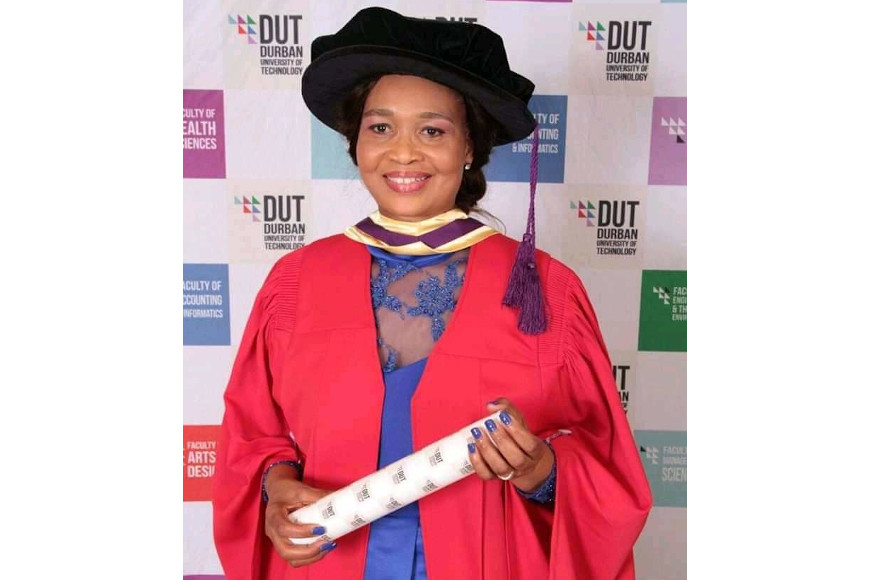The Durban University of Technology (DUT) continues to commend all its essential service workers for their dedication and commitment in providing services to the DUT community during the COVID-19 pandemic. DUT’s Communications team’s Waheeda Peters spoke to Senior Lecturer: Department of Nursing, Dr Dudu Gloria Sokhela who has been at DUT for 11 years.
Q: What is your role at DUT?
“I am a senior lecturer in the Department of Nursing in Durban. I teach the BTech Nursing: Primary Health Care (PHC) class, among that three that are offered namely BTech Nursing: Occupational Health Nursing and Nursing Management. Students are qualified professional nurses who come to DUT for a post basic specialisation. Primary Health Care is the first level of care where nurses practice independently without the presence of a doctor or may have a doctor once a week. They diagnose and treat patients and would refer to the next level of care if they see a need such as the Community Health centre or a hospital.”
Q: How long have you been in that role?
“I have been in this role at DUT for 11 years.”
Q: How would you describe yourself in five words?
A: “I am a compassionate, kind, strict, caring and an effective communicator.”
Q: What are your thoughts on International Nurses Day which was celebrated on 12 May 2021?
“This year’s (2021) theme is: A Voice to Lead – A Vision for Future Healthcare. As a nurse and nurse lecturer, this theme very much resonates with what I do. We have seen during the height of the COVID-19 pandemic in 2020 how nurses were at the forefront of the scourge, in my line of work, I taught nurses critical thinking and using evidence based practice which sharpened their skills and helped them face the pandemic. PHC is the first line and first contact for the community seeking medical care and medical information, it is very vital that nurses are well prepared to interact at this level.”
Q: How has it been like teaching during the COVID-19 pandemic?
“The pandemic forced both the lecturers and students to make use of online platforms for teaching and learning. It was an unknown territory; however, it is fortunate that I had been involved in Collaborative Online Learning previously, it was not too hard for me. The majority of challenges faced were those of connectivity and students taking time to adjust to online learning and to understand what was taught until they adjusted to not seeing a lecturer in a face to face lecture. It was challenging also in the fact that students as full-time employees who were affected in many ways by the COVID-19 pandemic and were at times unable to attend classes because they were exhausted, needed to fill in at work or were infected. As lecturers we had to deal with the psychological effects of the pandemic on students.”
Q: How do you ensure your safety during this difficult time?
“By following the COVID-19 protocols; wearing of masks, social distancing and regular washing of hands. Staying away from crowded areas and only going to the shops when it is absolutely necessary and taking my supplements.”
Q: How do you deal with the fear of contracting COVID-19 and losing a loved one due to the virus?
“At the beginning I was so scared I thought I would go crazy. I deal with it by talking about it openly about our fears and anxiety with my family members and friends, that helped me to cope. As a medical person I was also a resource for them, having to answer most of their questions and try to allay their anxiety and praying about it helped a great deal.”
Q: What does your typical day entails?
“Unfortunately, my typical day entails sitting with the laptop from morning to sunset; teaching, marking, attending meetings and webinars.”
Q: When not at work, what do you do for fun?
“My hobby which is singing is on hold since the pandemic, and I am scared of going to crowded places, fun for me is very limited to walking as part of exercising and listening to music, either on TV or radio.”
Q: If you were not in the healthcare profession, what would you be and why?
“There is actually nothing I would have preferred to do besides being in the health profession. After passing matric I only applied for nursing in different places.”


